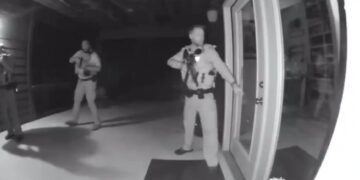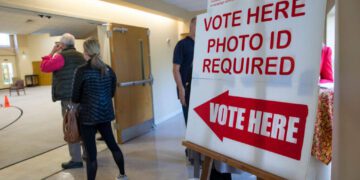By John F. Di Leo –
Public policy is about choices. It’s about recognizing the differences between different policy decisions, and forecasting the difference in potential results from those decisions.
For example:
What's the difference between getting diagnosed with heart disease in March or April and getting a stent or a bypass done and living another 25 years…
…or not going in, because everyone's scared to go to the hospital because of COVID-19, and having a fatal heart attack in June or July?
What's the difference between getting diagnosed with a stage 1 or 2 cancer in March and being able to cure it by surgery and/or chemo…
…and not going in when you notice the lump or the discoloration or the pain, because you're afraid of COVID-19, or because the hospital is shuttered out of fear of COVID-19, or because the hospital has been dedicated to COVID-19 patients only (who never materialized) so they refused all other patients and sat vacant for months… so you don't get diagnosed until August or September when it's gone to stage 3 or 4, and now you'll need surgery and lots of chemo and radiation, and your odds are now horrible because you let it go six months?
Incidentally, there are many other policy decisions besides healthcare-related ones, too. For example:
What's the difference between having a job and paying the bills, so you can put your kids through college…
… and losing that job, so that maybe you lose your house or business, maybe you have to abandon your retirement dream, maybe your kids can't go to college and instead wind up missing out on the career that they could've had, one that depended on that college degree, like being a doctor, a chemical engineer, an accountant or MBA?
What's the difference to that family, and to their kids and grandkids too – and perhaps to others they had supported, such as employees or relatives – when a five-month-long lockdown killed a family business that had lasted a century until now?
What’s the difference to a community, one that grew up around a single business or a cluster of businesses, such as a factory or hotel, or a restaurant center, or a truck stop intersection for travelers, or a busy shopping mall, all collapsing because that store, hotel, mall or other business center was destroyed by a five-month shutdown, throwing all those employees out of work, shutting down the other businesses that supported them along with it? Such a factory or mall creates work for lots of other businesses, such as a dry cleaner, a deli, a grocery store, a diner. The public policy question is, What does one policy choice or another do to all those people?
And what's the difference between a father or mother, or grandpa or grandma, who had gotten their substance abuse problems under control decades ago, and were happily raising a family…
… but now, the loss of a job or business or career, or even just the simple mental anguish of a world turned upside down by these COVID-19 shutdowns – isolated, deprived of human contact – now has them reverting to the bottle, or to the pill, or to the puff again… and it ruins their lives and their family's lives as a result?
And we must mention one more. What's the difference between a person who had perhaps always been borderline depressed, but maybe wasn't bad enough to be treated or medicated… until now… and now that person can't handle the lack of normal everyday human interaction, or becomes depressed for some other reason, like losing his job or business, and commits suicide as a result.
Yes, these ALL happen.
We don’t need to share names of people and businesses, names of towns and neighborhoods, in this column, because these stories have been happening over the past few months, all over the country. The names are different; the stories are the same. Because this is the cost of a massive economic lockdown. This is what happens when dictatorial mayors and governors issue endless shelter-in-place orders, depriving people of their work, their hobbies, and the human interaction that makes life worthwhile.
COVID-19 (or the CCP Virus, or Wuhan Flu, or whatever you want to call it) is real. It IS a danger. It hurts some people, even kills an unlucky few, and leaves permanent damage in some of those who survive it. All true, all tragic.
When those of us who oppose the lockdowns speak up, we are NOT being "uncaring." We are NOT being thoughtless. We DO understand the dangers of COVID-19 to the unlucky ones who get a bad case.
It may appear that we don't care, because we highlight the dangers of the lockdowns so much more loudly than we talk about the dangers of the virus, and if so, that's our fault for failing to communicate properly… but we DO care.
It's just that, we are trying to see the big picture. We are trying to see all of the effects, not just one.
That’s the job of a politician, or pundit, or writer, or activist. Our job – in designing public policy or in advocating for it - is to push the politicians and the public mind in the direction of the right/best solutions, even when there are no perfect choices.
Right now, we have one group of fearmongers pushing the theory that this CCP Virus is the ONLY threat, one that takes precedence over all other threats.
They have used this theory to destroy millions of small businesses, to wreck the already delicate industries of small retail and restaurants, to completely obliterate tourism and theatrical entertainment.
Those of us who disagree with the lockdown approach – primarily the Right, though that’s not quite a universal – are not saying that the CCP Virus is no threat at all.
We recognize that the virus is a terrible thing for some. We support goals to cure, to treat, to beat this thing. We support the Trump administration's diligent efforts to cut through FDA red tape and aggressively push toward vaccines and various treatments at record speed.
But we also feel there is a need to stress that the virus is just one of many threats out there; it is simply not the only one. And this is what the lockdown crowd either can’t or won’t acknowledge.
We are screaming to the rooftops that the lockdowns are doing a great deal of damage, other kinds of damage, far more lasting and destructive than the virus itself.
It's not just about people being marginally poorer for losing a few months' salary. No, it's about an explosion of other health care problems, like so many diseases going longer untreated, reducing survivability … problems like increased depression, which can lead to abuse and suicide and even murder-suicide….. and problems like explosions of crime (don't think for a minute that some of the damage done in this summer's downtown and mall rioting wasn't related to the lockdowns).
The Left portrays this as a matter of one side caring, and the other side not caring. It's a lie.
In fact, many on both sides may care, but the Right – the side that opposes the aggressive lockdowns - is the side that sees the big picture, and truly cares about the broader community.
The Right isn't just worried about COVID-19 alone. The Right is pleading with the public to ALSO care about the cancer patients, the heart patients, the stroke patients, the unemployed, the homeless, the victims of abuse. The undiagnosed, the untreated, the unseen, the unnoticed. We plead with the public to ALSO care about the mental health of our citizenry, not only their physical health.
Please. We must open our eyes, and look at the big picture… and safely, logically, but fully… Reopen America.
While there is still an America to reopen.
Copyright 2020 John F. Di Leo
John F. Di Leo is a Chicagoland-based trade compliance trainer, writer and actor. A former county chairman of the Milwaukee County Republican Party and former president of Chicago’s Ethnic American Council, he has been writing regularly in Illinois Review since 2009.
Don’t miss an article! Use the free tool in the margin to sign up for Illinois Review’s free email notification service, so you always know when Illinois Review publishes new content!







